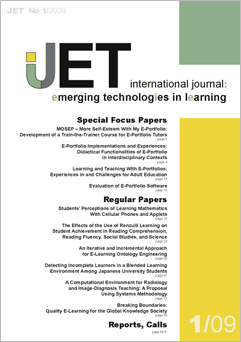Breaking Boundaries: Quality E-Learning for the Global Knowledge Society
DOI:
https://doi.org/10.3991/ijet.v4i1.664Keywords:
Globalisaation, JITAITS, Sloan-C the Five Pillars, Teaching/Learning, Virtual UniversitiesAbstract
The ideas and issues raised in this paper reflect a global challenge to understand the nature of E-learning in a knowledge society so that appropriate quality frameworks can be developed for new educational environments. E-learning and virtual classes evolved from distance education and struggle to gain recognition in mainstream education as legitimate quality higher education providers. The increasing use of information technology advances, particularly the internet present new educational paradigms and models that challenge conventional assumptions and indicators of quality assurance. What is needed is the development of global standards and quality assurance frameworks that can improve pedagogy in diverse cultural, knowledge and delivery paradigms. This paper seeks to explore how quality is defined, who sets whose standards, who will teach what to whom with what effect in a world of competing paradigms and parallel worlds of reality and virtual reality.
Downloads
Published
How to Cite
Issue
Section
License
The submitting author warrants that the submission is original and that she/he is the author of the submission together with the named co-authors; to the extend the submission incorporates text passages, figures, data or other material from the work of others, the submitting author has obtained any necessary permission.
Articles in this journal are published under the Creative Commons Attribution Licence (CC-BY What does this mean?). This is to get more legal certainty about what readers can do with published articles, and thus a wider dissemination and archiving, which in turn makes publishing with this journal more valuable for you, the authors.
By submitting an article the author grants to this journal the non-exclusive right to publish it. The author retains the copyright and the publishing rights for his article without any restrictions.



